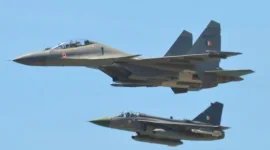- Views: 7K
- Replies: 137
India's ambitious plans for acquiring 114 Multi-Role Fighter Aircraft (MRFA) under a new "Make in India" policy may face challenges due to the reluctance of Dassault Aviation, the maker of the Rafale fighter jet, to comply with technology transfer requirements.
The Indian government's new policy mandates that the chosen aircraft for the MRFA program not only be purchased but also fully manufactured within India. This shift in policy signifies a strong push for self-reliance in the defence sector.
Despite the Rafale being a frontrunner in previous MRFA bids and India's ongoing procurement of the aircraft, Dassault's hesitation to share critical technology for local production could be a major hurdle. This is despite the fact that Dassault is experiencing a surge in export orders for the Rafale, with a backlog exceeding 200 units.
The new MRFA policy aims to establish a robust domestic aerospace industry, going beyond mere assembly to include full production and technology transfer. This is in line with the government's "Atmanirbhar Bharat" (self-reliant India) initiative.
However, Dassault's reluctance could lead to potential delays in the MRFA acquisition timeline. Other contenders for the contract, including Boeing, SAAB, Lockheed Martin, Russia's MiG, and the Eurofighter Typhoon, may now have an advantage if they are more willing to meet the new policy's stringent requirements.
This situation presents a complex challenge for India, as it seeks to balance its immediate need for fighter jets with its long-term goal of developing a self-sufficient defence industry. The outcome of this negotiation with Dassault and other potential vendors will be crucial in determining the future of India's MRFA program and its broader aspirations for self-reliance in defence.
It remains to be seen how this impasse will be resolved, but it is clear that the stakes are high for both Dassault and India. The successful implementation of the MRFA program is crucial for India's national security, and Dassault's willingness to adapt to the new policy could determine its continued involvement in the Indian defence market.

